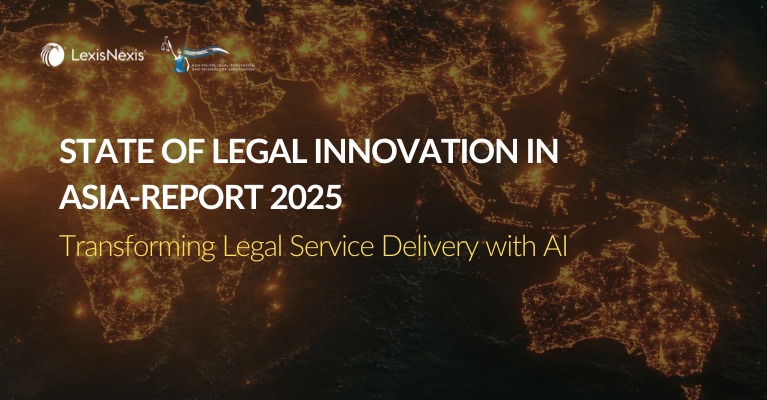The State of Legal Innovation in Asia-Pacific Report 2025 , produced by the Asia-Pacific Legal Innovation & Technology Association (ALITA) in collaboration with LexisNexis, dives into how artificial intelligence...
*The views expressed in externally authored materials linked or published on this site do not necessarily reflect the views of LexisNexis Legal & Professional. Corporate legal departments are under increasing...
The Total Economic Impact of LexisNexis Lexis+ AI for Large Law Firms, a commissioned study conducted by Forrester Consulting on behalf of LexisNexis, May 2025, projects that large law firms could achieve...
As Generative AI reshapes the legal landscape, choosing the right AI solution has become crucial for law firms and legal departments. According to a recent LexisNexis survey of over 400 lawyers and legal...
The legal world as we know it has become well-acquainted with technological disruption, experiencing successive waves in recent years. In early 2025, LexisNexis conducted a comprehensive survey about...

The State of Legal Innovation in Asia-Pacific Report 2025, produced by the Asia-Pacific Legal Innovation & Technology Association (ALITA) in collaboration with LexisNexis, dives into how artificial intelligence (AI) is reshaping the way legal services are delivered across the region.
With data captured at the APAC regional level and comparative insights drawn from other country-level surveys, the results provide a snapshot of current APAC lawyer AI usage as of August 2025. Beyond this, the survey delves into the opinions of APAC lawyers regarding the pros and cons of AI usage, the extent to which AI's ROI is measured, and its impact on law firm operations and business models.
Below, we have compiled five key takeaways from the survey results conducted by ALITA and LexisNexis.
Rising AI Adoption Amongst APAC Lawyer
One of the report's key findings is the significant rise in AI adoption among legal professionals. Nearly 90% of APAC legal professional respondents use AI in their work, either through widely available tools such as ChatGPT or through specialist legal AI platforms designed specifically for legal tasks.
Corporate legal departments, in particular, are leading the charge — often relying more on general-purpose AI tools than on platforms designed specifically for legal work.
General Purpose vs Specialised Legal Tools
Across APAC, conventional (non-AI) legal technology tools are still used for traditional legal-related tasks.
General-purpose AI tools are more favoured when it comes to executing administrative tasks. In contrast, specialist legal AI tools are more widely leveraged for substantive legal tasks where added domain expertise and data are critical to producing more reliable outputs.
Trust In Output Remains A High Concern
Despite the enthusiasm for AI and its obvious benefits in boosting productivity and saving time, APAC legal professionals share a consistent set of concerns.
Chief among them is the quality and accuracy of outputs, with more than 50% of respondents worried about hallucinations and fabricated information. Relatedly, time wasted reviewing unreliable outputs is a significant issue. Corporate in-house lawyers, in particular, were more concerned than those in law firms about hallucination risk (77%), in-built bias (49%), and deliverables not meeting expectations of the technology (35%).
Reshaping Financial Models and Boosting Efficiency
AI is also beginning to disrupt traditional business and financial models within law firms. As automation and efficiency gains reduce the time spent on repetitive work, firms are moving away from hourly billing toward more innovative fee structures — such as flat rates, a hybrid model that combines fixed and value-based pricing, or task-based pricing.
Despite AI's potential, few respondents currently see AI or data-driven pricing as the future, with only 19% selecting this option.
Preparing the Next Generation of Legal Professionals
As the legal profession embraces AI, practices will continue to evolve to both capture its benefits and address its challenges. One critical area highlighted in the report concerns the academic sector, with findings showing that traditional teaching models are widely seen as insufficient.
Law schools across the Asia-Pacific region today should integrate AI literacy, legal technology, ethics, and interdisciplinary learning, ensuring that graduates are equipped with the mindset and skillset to thrive in a rapidly evolving legal landscape.
Notably, corporate in-house lawyer respondents are even stronger advocates of reform, with 85% endorsing curriculum changes, compared to 70% of law firm lawyers.
**
If you are interested in reading the full report, click here to download a copy.
Discover how LexisNexis is setting the standard for responsible, secure AI in legal technology. Learn more about our ground-breaking AI-powered solutions: Lexis+ AI with Protégé
and follow along for the latest in Legal AI educational content.